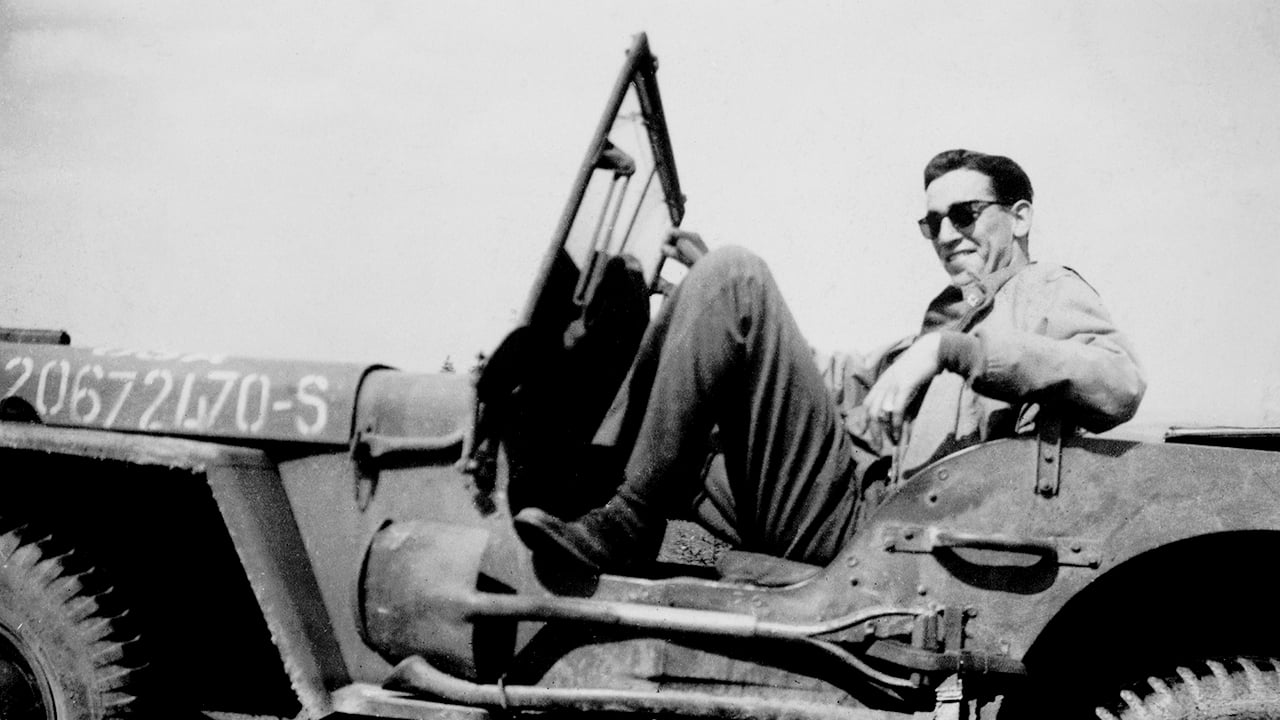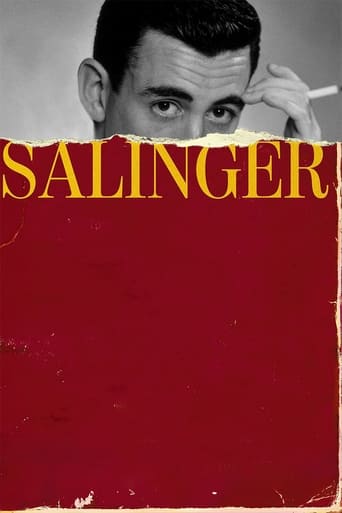Brightlyme
i know i wasted 90 mins of my life.
Doomtomylo
a film so unique, intoxicating and bizarre that it not only demands another viewing, but is also forgivable as a satirical comedy where the jokes eventually take the back seat.
AshUnow
This is a small, humorous movie in some ways, but it has a huge heart. What a nice experience.
Mischa Redfern
I didn’t really have many expectations going into the movie (good or bad), but I actually really enjoyed it. I really liked the characters and the banter between them.
msanticlimax
Let me preface this by saying that I'm a pretty huge fan of Salinger's work, and that I didn't go into this doc expecting very much. After all, what can you say about a man who famously kept his personal life as far away from the public eye as possible? As I found out, Shane Salerno's answer to that is "speculation, speculation, speculation."Not only was the technical quality of this film fairly sophomoric-- a heavy-handed score, the same "reenactments" repeated over and over, visual effects and transitions that looked like they came straight out of iMovie-- but a good portion of it was made up of (entirely white male) talking heads from Hollywood who had nothing to do with Salinger, relating tales of how The Catcher in the Rye changed their lives. That has no place in a documentary that is actually concerned with learning and teaching about a person, but it fits perfectly here, where it's clear that the filmmakers were most interested in duping Salinger fans with irrelevant anecdotes and padding out their scant "evidence" for Salinger's reclusiveness into a two-hour movie.And it's exactly his reclusiveness that the movie purports to be about, yet they seem to miss the most obvious conclusion: Salinger was a man like any other. There was no deeper meaning to the fact that he didn't want the media or rabid fans in his life, other than his rather private personality. Looking for one, claiming to have found it, and reeling an audience in for two hours of baseless accusations and factual errors, is frankly selfish and irritating. A person's life isn't ours to dissect and claim for ourselves, whether or not that person made something meaningful to us. Where these filmmakers could have created something touching and human, they created a morbid spectacle around a man who liked nothing less, and to me, that's pathetic and sad.
tomsview
I must admit that I did not know much about J.D. Salinger before I saw this documentary, so I actually got a lot out of it.I feel the film identifies the forces that shaped Salinger: his early quest to be published in the "New Yorker" magazine, and the status he felt that would bring him, then the withdrawal from public life when he became disillusioned with the trappings of fame. The film explores the impact of his unrequited love for Oona O'Neill, and the troubled relationships with the women who followed. "Salinger" also tells how memories of the war were never far from his mind for the rest of his life.Told entirely through interviews, the filmmakers found many of the key players in his life – some are riveting: the quiet dignity of the veterans he served with during the war balanced against tell-all accounts by some of the women he encountered and left behind. All add to an understanding of what the man wrote.The film details how Salinger entered military service in WW2, landed at Utah Beach on D-Day, fought across France into Germany then on to the Hurtgen Forest. He survived to see the horrors of Dachau concentration camp – eventually he suffered a breakdown.Just before seeing this documentary, I had read Robert Rush's "Hell in Hurtgen Forest". Having some idea about what Salinger must have experienced during the war is enough to get my respect even if he had never written anything more significant than a shopping list.Salinger was attracted to many beautiful young women – some of them very young. These days, with the paparazzi likely to pop up out of a celebrity's bowl of corn flakes, some of his relationships, no matter how platonic, would no doubt have attracted more attention than they did back then.Most intriguing was his marriage to a German girl just after the war – she a Nazi, he a Jew who had seen the concentration camps. This documentary didn't have to try too hard to portray Salinger as enigmatic.Throughout the film are interviews with people inspired by "Catcher in the Rye", who virtually stalked Salinger. They quite innocently tell how they tracked him down and forced a meeting. Along with murderers claiming they were inspired by "Catcher" to perpetrate their crimes, it's little wonder he became a semi-recluse.The film is visually stylish, even if some of the war footage gets a little mixed up. I also detected some surprising influences such as the multi-screen montage sequence and Craig Armstrong's anthem-like score from "Love Actually".However, "Salinger" captures the mystery of the man and the impact of his writing. One point really comes through; Salinger's characters were a part of him; they were expressions of everything he had experienced and felt, and he was protective of them. By the end of this film you understand why.
cricket crockett
Novelist W.P. Kinsella long ago helped America to "feel his pain" (that is, CATCHER IN THE RYE author J.D. Salinger's rage at a world in which Charlie Chaplin, 53, was able to elope with "Jerry's" presumed finance, Oona O'Neill, 17, when Pearl Harbor sent the 24-year-old virtually unpublished author overseas to go Nazi hunting on D-Day). Hollywood was so concerned about this powerful icon's deranged and unstable mind, that when they turned Kinsella's novel SHOELESS JOE into the Kevin Costner movie FIELD OF DREAMS, they felt compelled to transform the book's "J.D. Salinger" into a Salinger-lite character portrayed by James Earl Jones. In Salinger's mind, SALINGER makes clear, Charles Chaplin's well-publicized serial cherry-picking proved that the "GREAT DICTATOR" and everyone else over 30 were "phonies," giving young people license to "put their people hunting hats on." The historians interviewed in SALINGER concur that CATCHER has instigated more murders that any other American novel in history, with Mark David Chapman's assassination of John Lennon and John Hinckley's wounding of President Reagan just being the tip of the iceberg. A monster in his domestic life who is quoted by a friend as saying he wishes CATCHER had never been published, Salinger was so wounded by Chaplin that he was inspired to carefully craft CATCHER as a book bound to be "cool" to normal young people, but also to serve as an insidious Trojan Horse to push young men with "borderline personalities" over the edge to extract young Jerry's revenge against randomly picked celebrities such as Lennon and Reagan perceived as "phonies" by troubled minds (such as Salinger's). While J.D. did not have the guts to confront Chaplin himself, SALINGER makes clear that CATCHER inspires legions of "copycats" to go gunning for any prominent figure who incurs their delusional wrath or envy. Therefore, SALINGER implies that the editors at Harcourt Brace and the NEW YORKER MAGAZINE were heroes for having patriotic qualms and REJECTING Salinger's pleas to publish CATCHER, while the staffers at Little, Brown should be sued just as perverts circulating child pornography are today for the damage caused when they foisted CATCHER upon a mob of susceptible minds.Since you cannot put toothpaste back into the tube, NOW IS THE TIME "to nip in the bud" the posthumous publishing of the last 40 years of J.D.'s scribbling! SALINGER director Shane Salerno ludicrously implies there is a 50-50 chance these sure best-sellers (after all, they have name recognition) will be "literary masterpieces." I say the interviews of ACTUAL SALINGER ACQUAINTANCES and female stalking victims during Salerno's documentary PROVE that these books (if they actually exist) will be "Manchurian Candidates" to further corrupt American youth. Even Salinger admitted he was "crazy" by the time 299 straight days of combat topped by stumbling upon sky high stacks of nude corpses in one of Hitler's death camps first put him into an Army hospital with a "mental breakdown," and then caused him to illegally marry a die-hard card-carrying Nazi chick in Occupied Germany whom his unit was supposed to be punishing! Once this marriage was annulled, the Jewish Salinger converted to Eastern religions, adopted a mostly-peas diet, ignored his second wife and kids, and hunkered down in a concrete bunker to furiously type up thousands of "mash notes" to any underage teen girls whose addresses he got his hands on, actually deflowering a few of them on out-of-the-country trips financed by his mountain of CATCHER royalties. SALINGER documents every aspect of this disturbing psychosis, but CANNOT see the forest for all the trees! Who cares if J.D. landed on Utah Beach on D-Day with six chapters of CATCHER's manuscript under his uniform? It's likely there was some G.I. a few yards to his left or right with eight or nine chapters of a BETTER, SANER novel who got BLOWN UP--chapters and all--by a German artillery shell. No American should "feel his pain"--vicariously, or at the hands of a Holden Caulfield wannabe--ever again! Burn Salinger's papers now, before they attack us AGAIN like the BLOB!
david rishel
My Friday Video recommendation: Saw this recently and I was impressed. I'm not sure if it was the film or if it was the story of his life (which I did not know). I suppose, for either reason, my liking it was a nod to the filmmaker. What is most impressive about this film is its breadth. It takes you from his youth, through his service in WW II and after and it weaves his life and the writing together, all in the context of the history of the 20th century. It does a really good job of putting you into the mood of the moment as it moves you along, letting your thoughts and feelings evolve as you discover more and more as it happened. It also seemed to take you on a mental journey similar to what people must have thought of him over the years; from when he was fresh and just published--what a sensation--and how that must have changed over the years as we learn more about the man and who & what he is inside. The filmmakers talked with hundreds of people--people of stature and those from his personal life--and shot hours and hours of interviews and conversations to put it together. The film does not adore him and it does not vilify him; or perhaps it does both. I could have lived without some of the "dramatic reenactments," but I suppose they filled the visual scene while the narrative unspooled. If you have read "the book" and ever wanted to learn more, or if you have an interest in Salinger, I do recommend this.

